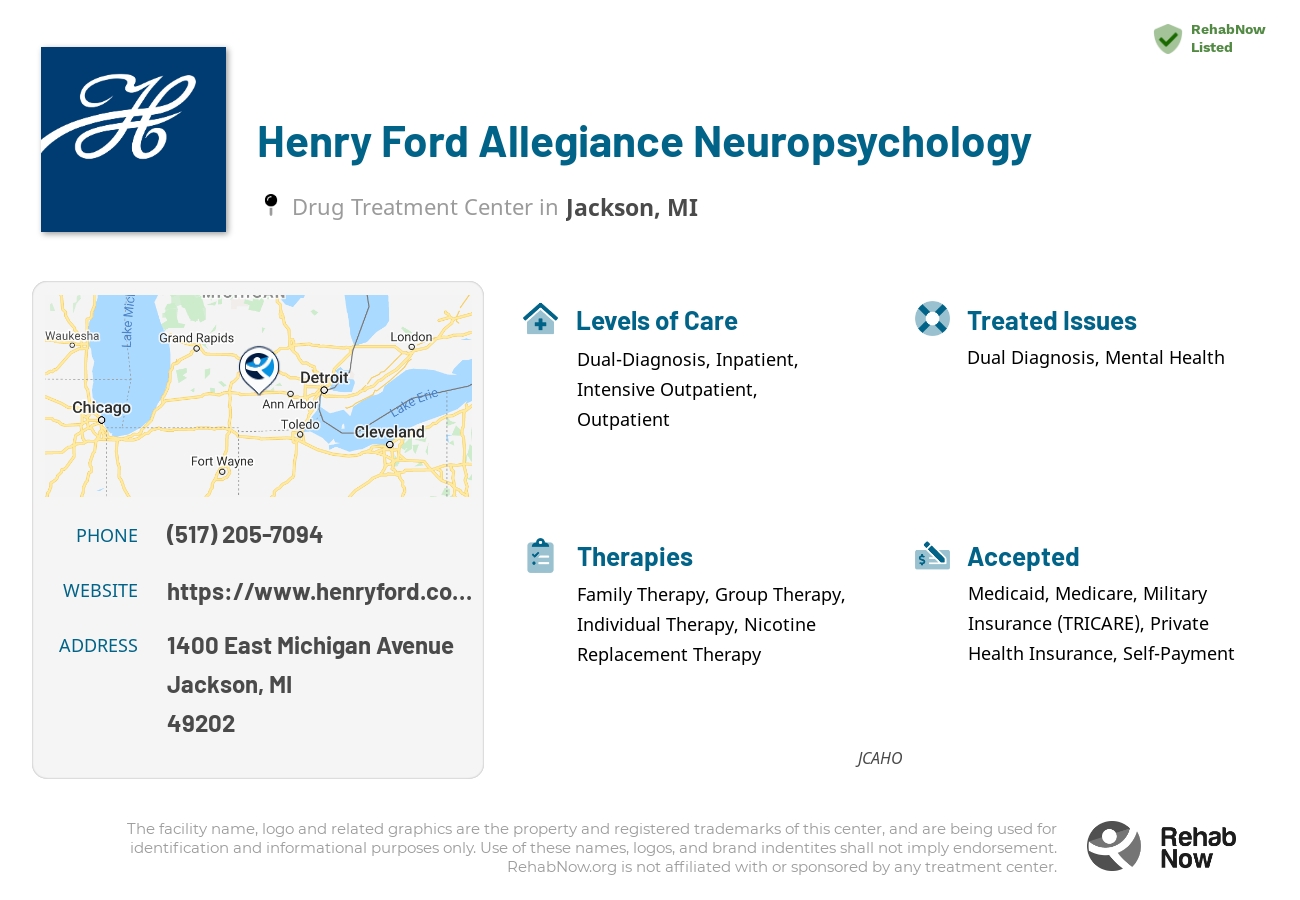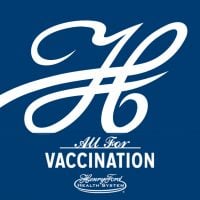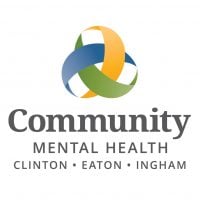
Henry Ford Allegiance Neuropsychology
Drug Rehab Center in Jackson, Michigan
- Mental Health
- Dual Diagnosis
Henry Ford Allegiance Neuropsychology in Jackson, Michigan offers mental health services, including addiction counseling and substance abuse treatment, with a team of highly trained specialists providing personalized and compassionate care, and accredited by multiple organizations to ensure quality standards.
About Henry Ford Allegiance Neuropsychology in Michigan
Henry Ford Allegiance Neuropsychology is an Addiction Treatment Facility located in Jackson, MI. Established in 1915, this facility has a long-standing history of providing top-quality care for individuals suffering from Dual Diagnosis, Mental Health, Drug Addiction, Substance Abuse, and Opioid Addiction. Accredited by both SAMHSA and JCAHO, Henry Ford Allegiance Neuropsychology offers a comprehensive range of treatment options, including Dual-Diagnosis, Inpatient, Intensive Outpatient, Outpatient, Detox, Aftercare Support, and Partial-Hospitalization. This facility is affiliated with the prestigious Henry Ford Health System and accepts private health insurance, making it accessible to individuals seeking recovery.
At Henry Ford Allegiance Neuropsychology, individuals struggling with addiction and substance abuse can expect a wide range of effective and evidence-based services. With a focus on providing personalized care, this facility offers a holistic approach to treatment. Their services include therapy, counseling, medication-assisted treatment, group support, and education on relapse prevention. The dedicated team of professionals at Henry Ford Allegiance Neuropsychology understands the complex nature of addiction and aims to address not only the physical aspect but also the mental and emotional components. By offering a variety of treatment levels, including detoxification, inpatient care, and outpatient programs, individuals can receive the level of care that best suits their needs. Additionally, the facility provides aftercare support to assist individuals in their transition back to their daily lives after completing treatment.
Genders
Ages
Modality
Additional
Accreditations
SAMHSA

JCAHO
Conditions and Issues Treated
Dual Diagnosis is a specific relationship between two or more disorders that have the same symptoms and can sometimes be treated together. This is used in the treatment planning process when dealing with drug addicts. Dual diagnosis can be viewed as a chronic medical condition that has comorbid psychiatric disorders.
Although addiction and a mental illness may have separate symptoms that are not easy to detect, they often go hand in hand. Many times, drug abuse is a direct result of the mental illness. In other words, treating the addiction will not resolve all of your issues. Unless you also treat the underlying mental illness, you will not be successful in achieving sobriety.
Levels of Care Offered
This center offers a variety of custom treatment tailored to individual recovery. Currently available are Dual-Diagnosis, Inpatient, Intensive Outpatient, Outpatient, with additional therapies available as listed below.
Inpatient treatment is an intensive program that takes place when a patient checks into a rehabilitation facility. The treatment includes detoxification and counseling sessions, which are round the clock. Outpatient treatments are also available, but inpatient care is advised as the first step of rehabilitation.
Intensive rehab ensures the patient stays in a substance-free atmosphere, improving treatment success rates. The patient participates in group therapy for motivation from other patients who have overcome addiction. Family members are also involved in providing emotional support throughout the program.
An intensive outpatient program is usually the first phase of addiction treatment. It provides relief for those who are addicted, but are not ready to commit to an inpatient setting. Typically, the patient lives at home and is able to work or go to school. IOPs consist of a daily 3 to 5-hour program, and there is a required number of hours per week. Most patients go to IOP between 20 and 40 hours per week. The patient attends group counseling and individual therapy throughout the duration of treatment. They also meet daily with their therapist to discuss how it’s going and where they are in the recovery process.
The goal here is to teach patients healthy coping skills, such as stress management and identifying thoughts and behaviors that lead to relapse. The implementation of these skills will be useful as the individual transitions into the next phases of treatment.
An outpatient treatment program is set up to help with alcohol or drug addiction, or a co-occurring disorder. The patient must attend the Michigan facility for their therapy and other programs but are able to return home each night. The frequency of mandatory attendance decreases after much of Henry Ford Allegiance Neuropsychology‘s program is complete.
Therapies & Programs
Individual Therapy is a critical component of addiction recovery. Therapists work with patients to identify the root of their addiction and figure out how to better handle the issues that led to them using drugs. Individual Therapy is the one-on-one session where people meet with their therapist. Individual therapy provides a safe space for people to open up and discuss personal and sensitive topics which they may not feel comfortable discussing in a group setting.
Family therapy will also help families realize that the addiction is not their fault. For many years, people blamed themselves for an addict’s behavior and felt that they had done something wrong. This is not the case. Addiction is a disease, and it can strike anyone, even if their life seems fine from the outside. It can bring a lot of shame to a family when they have an addict in their midst, but if everyone is open and honest with each other, then they can help everyone stay in recovery.
Group Therapy is utilized by drug treatment centers like Henry Ford Allegiance Neuropsychology to provide the recovering drug addict with a platform to talk about their feelings and experiences. It also provides for an opportunity to learn from other addicts who have successfully overcome their addiction.
Group Therapy is employed in lectures, seminars, or discussion groups (the latter two are typically conducted as “therapy groups”). It is recommended that all group members be recovering addicts for this type of therapy to work (though it does not exclude others with lived experience).
Payment Options Accepted
For specific insurance or payment methods please contact us.
Is your insurance accepted?
Ask an expert, call (888) 674-0062
Henry Ford Health System Associated Centers
Discover treatment facilities under the same provider.
- Henry Ford Allegiance - Addiction Recovery Center in Jackson, MI
- Henry Ford Health System in West Bloomfield, MI
- Henry Ford Health Systems - Maplegrove Ctr for Chem Dependency in West Bloomfield, MI
- Henry Ford Behavioral Health - Seville in Clinton Township, MI
- Henry Ford Allegiance - Substance Abuse Services in Jackson, MI
Learn More About Henry Ford Health System Centers
Additional Details
Specifics, location, and helpful extra information.
Jackson, Michigan 49202 Phone Number(517) 205-7094 Meta DetailsUpdated November 25, 2023
Staff Verified
Henry Ford Allegiance Neuropsychology Patient Reviews
There are no reviews yet. Be the first one to write one.
Jackson, Michigan Addiction Information
Michigan has the second-highest rate of drug and alcohol abuse in the nation. Heroin is linked to more than 50% of the state's hepatitis C cases. Marijuana is the drug most often associated with crimes in Michigan, followed by methamphetamines. Opioids alone are responsible for almost 20% of all drug overdose deaths in Michigan.
In Jackson, Michigan, there are more than 40 deaths caused by drug overdoses in 2013. This adds up to about 15% of all the fatal injuries in the city. The total number of arrests for drug-related crimes in 2012 was just over 1,500. The most common drugs of abuse are heroin, LSD, marijuana, crack cocaine, and methamphetamine.
Treatment in Nearby Cities
- Clarkston, MI (59.6 mi.)
- Chelsea, MI (19.3 mi.)
- Jonesville, MI (23.2 mi.)
- Pigeon, MI (122.9 mi.)
- Imlay City, MI (85.5 mi.)
Centers near Henry Ford Allegiance Neuropsychology
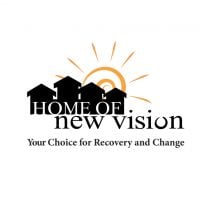
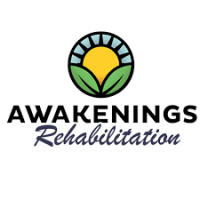

The facility name, logo and brand are the property and registered trademarks of Henry Ford Allegiance Neuropsychology, and are being used for identification and informational purposes only. Use of these names, logos and brands shall not imply endorsement. RehabNow.org is not affiliated with or sponsored by Henry Ford Allegiance Neuropsychology.



